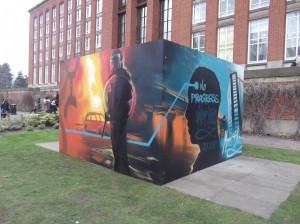
The word ‘blurred’ perfectly captures the context within which urban political theologies in the twenty-first century are forged. The ‘blurring’ of previously ‘solid’ cultural demarcations, ethnic identities, class divisions, political ideologies, religious boundaries and urban geographies is not new as Manuel Castells and Edward Soja noted over a decade ago. In a globalised century however this ‘blurred’ world has become the norm and not the exception. Unless contemporary theologies grapple in depth with this ‘blurred’ context they will become increasingly irrelevant to all but a declining religious minority. The step into this fluid city challenges what might be called ‘solid’ theological and ecclesiological models. Such stepping out also raises key questions about the extent to which so-called ‘fresh’ expressions of church and what Pete Ward has called ‘liquid church’ are ‘fresh’ enough or ‘liquid’ enough to engage credibly with the ‘blurred’ ‘post-religious’ twenty-first century world…
The media has been flush with stories and commentary on religion in the public square. When a panel of religious leaders is called to testify before a congressional oversight hearing, how could it be otherwise? For a country which has canonized a separation between religion and governance these spectacles of power and politicking quickly call into question the Post-Christendom thesis….
I would like a vote in the decision to choose the next Archbishop of Canterbury. Ideally, if I am honest, secretly, I would quite like to have the only vote. But that would be monarchy, and I don’t believe in that for all sorts of reasons, and nor do I believe in oligarchy, so what I would like to see is a democratic election. Perhaps something like they have in the Episcopal Church in the US, an open contest in which candidates put forward their ecclesial and spiritual credentials…

Over the last few years I’ve noticed several key strands emerging in relation to thinking about the nature and role of ‘Church’ in the 21st century….At one end of the spectrum we find attempts to re-assert a ‘church-centric’ postmodern Christian vision which arguably eschews serious engagement with the social sciences and is wary of faith groups partnering with government. We could think of this as an ecclesiology of/for the ‘big society’, a new ‘Christendom’ or what has become known as ‘radical orthodoxy’ (seen for example in the work of John Millbank). At a grassroots level it’s possible to see some linkage between these ideas and what has become known as ‘emergent church’. At the other end of the same spectrum we see the emergence of an alternative ‘post-secular’ theological narrative within which ‘Church’ finds its space as part of a network (or perhaps rhizome) of narratives of meaning in a society that has become increasingly suspicious of organized religion of any sort. We might call this ‘third space’ ecclesiology (seen perhaps in the work of Chris Baker) – more ‘Occupy’ than ‘big society’. As the place of faith in the public sphere has once again become a central political question the Christian community in the UK finds itself at a watershed moment. These two strands of political theology continue to stimulate challenging discussions about the future for faith in the 21st century. And yet both approaches leave me feeling uneasy for three reasons…